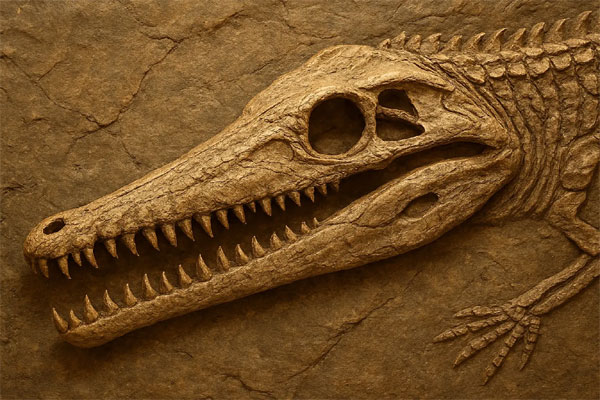Daijiworld Media Network - Jaisalmer
Jaisalmer, Aug 25: In a groundbreaking discovery, scientists have unearthed a 201-million-year-old fossil of a phytosaur—a prehistoric reptile resembling modern-day crocodiles—in Megha village of Jaisalmer, Rajasthan. The fossil, found near a local pond in the Fatehgarh subdivision, is believed to be the first of its kind from Jurassic-era rocks in India and ranks among the country’s oldest fossil finds.
Villagers first spotted the skeletal remains on August 21 and alerted the local administration. Dr. Narayan Das Inkhaiya, a senior groundwater scientist, was the first expert to examine the site and confirm the fossil’s Jurassic origins. His findings were later corroborated by Dr. V.S. Parihar, Dean of the Institute of Earth Sciences at JNVU Jodhpur, who has since begun leading an in-depth scientific study of the specimen.

Dr. Parihar noted that the fossil is approximately 1.5 to 2 meters long and belongs to the phytosaur species—ancient, crocodile-shaped reptiles that predate even dinosaurs. These creatures, sometimes referred to as "tree lizards," once roamed the dense forests and riverbanks of the Late Triassic to Early Jurassic period.
Researchers found notable similarities between the fossil’s spine and that of present-day crocodiles, indicating a close evolutionary link. Authorities have fenced off the site to protect it during ongoing and future studies.
The Geological Survey of India (GSI) is now set to begin a comprehensive excavation, with experts hopeful that the site may yield additional fossils of other prehistoric lifeforms.
Jaisalmer has long held a reputation for significant paleontological discoveries. The region has previously revealed dinosaur footprints in Thaiyat, fossilised trees estimated to be 180 million years old in Akal (now preserved in the Wood Fossil Park), and numerous dinosaur remains in Jethwai Hill, Thaiyat, and Lathi—earning them the title of "villages of dinosaurs."
Though mining once threatened these valuable fossil beds, state intervention has since halted quarrying activities to preserve these ancient treasures.